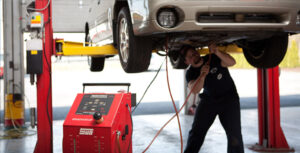Why Does Your Vehicle Need Transmission Service?
The Real Importance of Transmission Service
Transmission maintenance is one of the more commonly neglected parts of keeping a vehicle operating in a safe and effective manner. When a vehicle needs the gas refilled, it’s quick to alert the driver. But transmission fluid is another matter. Some vehicles do have an automated reminder. However, for most people, it’s something that they’re going to have to remember on their own.
Transmission service refers to work on a variety of different parts of a vehicle’s basic transmission system. In the simplest terms, the transmission transmits energy from the engine to the wheels. When people refer to a vehicle as manual or automatic, they’re referring to the way the driver operates the transmission system. They either do it manually or rely on automated systems to handle it.
If the engine is the heart of a vehicle, the transmission can be thought of as the circulatory system. And problems with the transmission are just as significant to a vehicle as circulatory issues are to a person. Thankfully transmission service will usually take care of most problems in the system.
There are two main reasons why transmissions need to be serviced. The first is a preventative measure. Transmission fluid needs to be changed every 30,000 to 100,000 miles or so. Failing to regularly change transmission fluid can lead to damage of various other parts of the vehicle. General wear and tear, direct damage or environmental factors can all have a negative impact on the transmission’s health. One sign of this is grinding noises. This is a result of gears that aren’t properly lubricated. Small puddles underneath a parked vehicle can indicate that transmission fluid is leaking. Other signs can include a more subtle burnt smell within and near one’s vehicle.
All of these signs point to a need for transmission repair. It’s important to do this as quickly as possible. Waiting too long for transmission repair can create a domino effect where it creates problems which in turn create new issues. It can also mean the difference between a repair job and a full replacement. A repair simply involves fixing a small number of localized issues within the transmission system. For example, a small leak. A full replacement is a costly process which essentially removes the damaged transmission system in order to replace it with a new one. As this is one of the more costly procedures, it’s important to have issues with one’s transmission take care of before they begin to escalate.

Does your car need a transmission fluid flush?
Your car’s transmission is one of its most important internal system. Without a transmission, your engine would not be able to power your wheels forward. If you are considering scheduling automatic transmission repair in Silver Springs, MD, you may want to consider setting up a transmission flush for your vehicle. By including a flush service during your transmission repair, you can rest assured that your vehicle is ready to travel for many more miles down the road. Here is a look at how to decide whether your vehicle needs a transmission flush.
Car Mileage
When you are deciding whether to schedule a transmission flush for your vehicle , you can start by looking at the mileage on your car. Depending on your manufacturer’s instructions, you may need to perform a fluid flush about every 100,000 miles. If your car has reached this maintenance milestone, you may want to talk to your mechanic about scheduling a transmission flush.
Driving Conditions
Along with considering the mileage of your car, you should also look at your typical driving conditions. When you drive over hilly terrain or in continuously stop and go traffic, these conditions can put a strain on your automatic transmission fluid. A fluid flush can help to keep your vehicle on the road for longer.
Dirty Fluid
Another way to determine when it is time to schedule a transmission fluid flush is to look at your fluid, itself. When your car is in need of a fluid flush, you may notice that your vehicle has dirty or dark transmission fluid.

What is a Transmission, anyway?
What is a transmission? It’s an intricate system of gears and sensors that delivery the power from your engine to your drivetrain and wheels. The transmission ensures that the energy provided by the engine travels smoothly to the tires and to the road, providing smooth power and acceleration and safe control for the driver.
This job generates a lot of heat, though, and your transmission fluid keeps your transmission lubricated and keeps it from getting too hot. If your transmission gets too hot it can damage the parts that do all that work and cause big problems over time. As the transmission fluid is used up over time, it becomes less efficient and leaves your transmission more vulnerable to wear and to heat damage.
An Ounce of Prevention…
The best way to prevent costly transmission repairs is to keep your transmission fluid fresh. At EPR Automotive, we can inspect your fluids, remove your old transmission fluid, perform a complete flush of your transmission system, and install new, premium-quality fluid. We use only the best transmission fluid, as well as state-of-the-art technology to monitor this proces. Transmission experts recommend getting an automatic transmission fluid exchange every 50,000 miles. Typically factory recommended service is a little bit more than that, but it doesn’t account for harsh driving and weather conditions drivers’ face on a daily basis.
Use the Correct Transmission Fluid
Although it might seem obvious, many people don’t know it’s essential to use the automatic transmission fluid recommended by your vehicle’s manufacturer. This is because different fluids contain different additives that function specifically for certain transmissions. Only the recommended type will ensure your transmission performs correctly. In the event that you’ve had the original transmission changed should you use the recommended fluid for that particular transmission.

What is a transmission leak?
A transmission leak marks one of the most common car maintenance issues. It can be caused by not changing the transmission fluid often enough, by an accident, or from normal wear and tear. Low fluid levels can cause your transmission to slip and overheat. If you see dark red or brown fluid underneath your car, have it checked immediately. We say this only because transmission leaks will quickly cause the entire system to fail. Transmission is dependent on fluid so if the fluid level is fleeting, nothing will work properly.
What does it mean to flush the transmission fluid?
Power-flushing your system is one of the best transmission maintenance procedures available. Instead of just changing the transmission fluid, a mechanic will use a machine that runs new oil through your transmission. While pushing out built up sludge and grime, this process replaces every drop of used fluid with completely fresh fluid. A flush will cost around $255.
Automatic Transmission
Automatic Transmissions shift between gears automatically to optimize driving, and changes gears based on the driver’s throttle pedal, vehicle speed, engine speed, and vehicle load. Typical automatic transmissions have 4-5 forward gear ratios, a Reverse, Park, and Neutral gear. Shifting gears occur automatically once the car is in Drive and there is no need for a clutch pedal or gear shift like there is in a Manual Transmission. Automatic transmission repair is complicated based on all the components that make it up, and you need to have any automatic transmission issues properly assessed by auto mechanics.
Manual Transmission
Driving a vehicle with a Manual Transmission requires using the clutch pedal and gear shift to manually shift gears based on the speed of the vehicle. Manual transmissions have been built with anywhere from two to eight gears. Front-wheel drive and rear-wheel drive are the two main configurations for manual transmissions. Typically, manual transmissions require less maintenance then automatic transmissions.